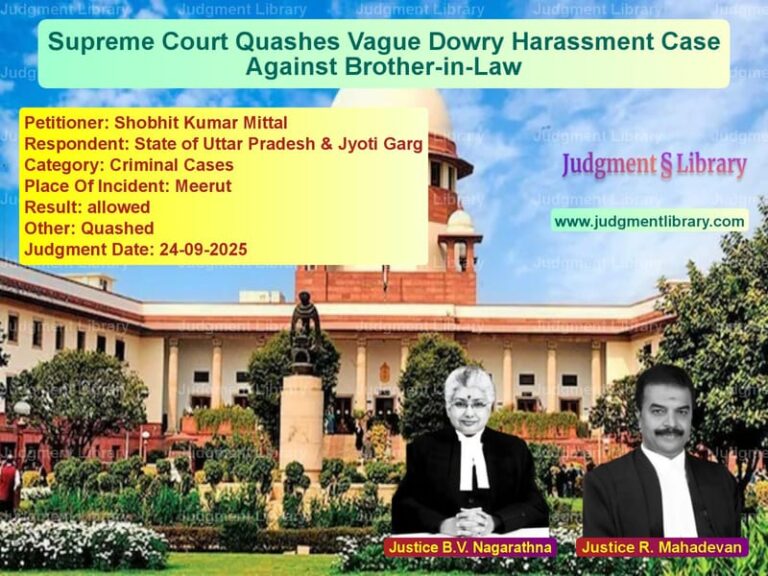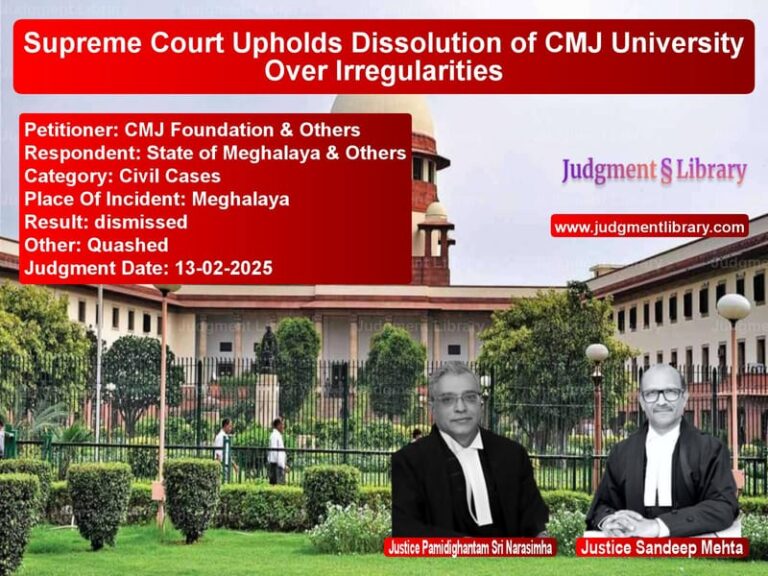Supreme Court Stays Urban Development Tax Demand in Rajasthan Medical Relief Case
The Supreme Court of India, in the case of Amar Jain Medical Relief Society & Anr. v. State of Rajasthan & Ors., delivered a judgment that provided temporary relief to the appellants regarding the payment of Urban Development Tax. The Court directed the Rajasthan High Court to expedite the disposal of the pending writ petition that questions the validity of the tax liability.
Background of the Case
The appellants, Amar Jain Medical Relief Society, approached the Supreme Court aggrieved by an interim order of the Rajasthan High Court dated March 18, 2016. The High Court had directed them to deposit 50% of the Urban Development Tax as a precondition to the continuation of their case. The appellants contended that:
- Their liability to pay the Urban Development Tax was still under judicial review in Civil Writ Petition No. 3068 of 2016, pending before the High Court.
- Forcing them to deposit 50% of the tax while the case was pending was unjustified.
- Their organization, being a medical relief society, was not liable for the Urban Development Tax under the existing rules.
Supreme Court’s Interim Relief
On April 1, 2016, the Supreme Court issued an interim stay on the High Court’s direction requiring the appellants to deposit 50% of the tax amount. Additionally, the Court ordered a stay on any coercive measures taken by the Jaipur Municipal Corporation to recover the tax.
Arguments by the Appellants
The appellants raised the following arguments before the Supreme Court:
- They had filed a writ petition before the Rajasthan High Court challenging the Urban Development Tax demand.
- The case had yet to be decided, and until the final judgment, no tax liability should be imposed.
- Their institution was a charitable medical relief society and should not be subject to urban development tax.
- The demand notices issued by the Jaipur Municipal Corporation were arbitrary and without legal basis.
Arguments by the Respondents
The Rajasthan Government and the Jaipur Municipal Corporation defended their stance, arguing:
- The appellants’ institution was liable to pay Urban Development Tax like other establishments.
- The demand notices were issued as per the Urban Development Tax Act applicable in Rajasthan.
- The High Court’s order requiring a 50% deposit was a reasonable condition to ensure compliance with legal obligations.
Supreme Court’s Observations
1. No Immediate Need for Tax Payment
The Supreme Court held that forcing the appellants to deposit 50% of the tax before the High Court ruled on the writ petition was unjustified. The Court stated:
“In case the High Court allows the writ petition, there is no liability for the appellants to pay the Urban Development Tax.”
2. Urgency in Resolving the Writ Petition
The Supreme Court emphasized that the Rajasthan High Court should decide the matter quickly. It stated:
“We are of the view that the High Court should first decide Civil Writ Petition No. 3068 of 2016 expeditiously.”
To ensure a timely decision, the Supreme Court instructed the High Court to dispose of the matter within six months.
3. Continuation of Interim Stay
The Supreme Court ruled that until the High Court decides the case:
- The interim stay granted on April 1, 2016, will continue.
- The Jaipur Municipal Corporation cannot take coercive steps to recover the tax amount.
Supreme Court’s Final Decision
- The appeal was disposed of with a direction to the Rajasthan High Court to decide the pending writ petition within six months.
- The interim stay on the demand for 50% of the tax will remain in force until the High Court delivers its judgment.
- The Jaipur Municipal Corporation cannot enforce the demand notices until the final decision is made.
- No costs were imposed on either party.
Implications of the Judgment
The Supreme Court’s decision in Amar Jain Medical Relief Society v. State of Rajasthan has several key implications:
1. Protection Against Premature Tax Recovery
The ruling ensures that taxpayers are not forced to pay disputed taxes before their case is heard and decided by the courts.
2. Expedited Judicial Review
The Supreme Court reinforced the importance of timely disposal of tax disputes, preventing unnecessary financial burdens on litigants.
3. Relief for Charitable Institutions
If the Rajasthan High Court eventually rules in favor of the appellants, it could set a precedent for medical and charitable institutions seeking exemptions from urban development tax.
Conclusion
The Supreme Court’s ruling in Amar Jain Medical Relief Society v. State of Rajasthan provides much-needed relief to taxpayers facing premature tax recovery demands. The judgment ensures that the appellants are not forced to pay Urban Development Tax until their case is fully heard and decided.
By directing the High Court to resolve the matter within six months, the Supreme Court emphasized the importance of judicial efficiency in tax-related disputes. This case serves as an important precedent for organizations challenging municipal tax demands in India.
Don’t miss out on the full details! Download the complete judgment in PDF format below and gain valuable insights instantly!
Download Judgment: Amar Jain Medical Re vs State of Rajasthan & Supreme Court of India Judgment Dated 22-07-2016-1741873440311.pdf
Direct Downlaod Judgment: Direct downlaod this Judgment
See all petitions in Tax Refund Disputes
See all petitions in Banking Regulations
See all petitions in Judgment by Kurian Joseph
See all petitions in Judgment by Rohinton Fali Nariman
See all petitions in partially allowed
See all petitions in Stayed
See all petitions in supreme court of India judgments July 2016
See all petitions in 2016 judgments
See all posts in Taxation and Financial Cases Category
See all allowed petitions in Taxation and Financial Cases Category
See all Dismissed petitions in Taxation and Financial Cases Category
See all partially allowed petitions in Taxation and Financial Cases Category







